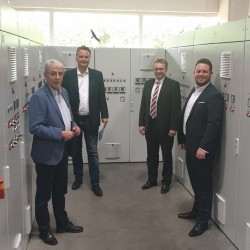Parliamentary representative Dr. Günter Krings visiting Hepp-Schwamborn

(from left to right: Kuno Schwamborn, Dr. Günter Krings, Michael Déjosez and Markus Kaumanns)
July 19th, 2021: "Tradition. Innovation. Power." - under this triad Hepp-Schwamborn GmbH & Co. KG offers a broad portfolio of electrotechnical solutions for commercial and industrial customers. Reason enough for Dr. Günter Krings, parliamentary representative from Mönchengladbach, to pay a visit to the company, which is now in its third generation of owner-management, as part of his summer tour. Managing Director Kuno Schwamborn received Krings, who was accompanied by Councilman Markus Kaumanns and District Representative Michael Déjosez as representatives of the CDU Rheydt, at Bunsenstraße. After a tour of the company premises, the focus of the exchange with the Christian Democrats was on the history, present and, in particular, future prospects of Hepp-Schamborn.
100 years of Hepp-Schwamborn - last year, Kuno Schwammborn and his employees were able to celebrate this proud company anniversary, even though they were unable to celebrate due to the pandemic. Since its foundation by Kuno Hepp in 1920, the company has remained true to its main focus, the design and installation of electrical industrial equipment. Kuno Schwamborn explains that the constant change in concrete projects can be used to trace one or the other innovation thrust in European economic history. In the beginning, the vision was to replace steam engines with electric drives in the domestic textile industry, but in the post-war period, mechanical engineering, the electrical equipment of pipeline plants and building installation became more and more important. In the meantime, Hepp-Schwamborn is broadly positioned in energy, building and automation technology. Kuno Schwamborn also wants to take the next steps in electromobility and residential construction together with his approximately 160 dedicated employees: "Without the perseverance and innovative potential of our employees, we would not be where we are today. We attach great importance to satisfied employees and want to retain our family atmosphere despite continuous growth." This philosophy is matched by the importance of sound training: "We not only hire three to five apprentices in each apprenticeship year. We guarantee intensive supervision by proven experts," says Kuno Schwamborn, describing his qualification strategy: "We train primarily for our own needs. Our apprentices are also our future!" Hepp-Schwamborn offers apprenticeships as an electronics technician for energy and building technology.
Günter Krings was impressed by the company's adaptability and innovative potential: "With Hepp-Schwamborn, a traditional industrial craft business sees its future in the heart of our city. I am very pleased about this. Because I am convinced that industrial production must be possible in Germany and also here in Mönchengladbach." According to Krings, it is of outstanding importance for our region that there is local competence in special electrical engineering issues: "I am only thinking of the Herculean task of getting to grips with the consequences of open-cast lignite mining. And Hepp-Schwamborn's experience in pump technology will also, unfortunately, become increasingly important in combating heavy rain and flooding."
Kuno Schwamborn and Günter Krings concluded by addressing general political issues, such as the problems of supply chains and the burden of bureaucracy on very small companies in particular. Krings and Schwamborn agreed on one central task for the future: "Digitization is the key to an innovative society. Whether in companies or in schools - we need a modernization push here in particular."
Image: Tobias Koch
Author: Dr. Günter Krings MdB